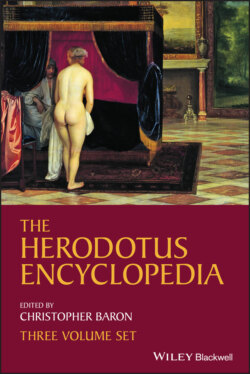Читать книгу The Herodotus Encyclopedia - Группа авторов - Страница 833
ATHENIAN EMPIRE
ОглавлениеGRÉGORY BONNIN
Université Bordeaux–Montaigne
The Athenian Empire was an evolving power structure which dominated the Greek states of the AEGEAN basin during a major part of the fifth century BCE. The alliance of Greek city‐states which arose out of the victory over PERSIA in 480–479—known to scholars as the DELIAN LEAGUE—came to be led by ATHENS in 478/7 after SPARTA’s withdrawal, and evolved into a real empire (Meiggs 1972; Mattingly 1996; French scholars, however, are still reticent to assume its title of “empire”: Pébarthe 2008; Bonnin 2015, 32–36).
Even if Herodotus wrote his work while in Athens during the very acme of the Athenian Empire, he does not say much about it, most certainly because the people of the period that he chose to talk about were not aware of the Athenian Empire, nor even of the Delian League. Nonetheless, the creation of the Delian League was a consequence of the Greco‐PERSIAN WARS, and those were the major topic of Herodotus’ work. Although we are bound to find less information about Athenian imperialism in Herodotus than in THUCYDIDES, given the chronological range each author explored, Herodotus’ stories reveal, in their background, the period of the Athenian Empire’s genesis.
At the end of the Greco‐Persian wars, Sparta, which had led the Hellenic alliance against the Persian invasion, decided to end its participation in operations against the Great King’s territories. When Sparta chose to withdraw its troops and its leader, the general and regent PAUSANIAS, most other Peloponnesian CITIES followed suit, hence creating a new opportunity for Athens. The Athenians had successfully fought two wars against Persia, and they had been the first Greeks to manage defeating the barbarians, at MARATHON in 490. Athenian propaganda frequently used this victory, as can be seen in Herodotus’ version of the run‐up to the Battle of PLATAEA (9.46–47). This aura, added to another one, more ancient, which considered the Athenian people the bravest amongst the IONIANS (also enforced by fifth‐century Athenian propaganda), made Athens a natural leader. Thus in 478/7, the Delian League was created by Ionians following their new hegemon, Athens.
Many questions about the structure and boundaries of Athenian power remain difficult to answer, in part because of the multivalence of the term ARCHĒ in Book 1 of Thucydides. It should be noted that Herodotus did not call the Athenian power an archē, a word he does use in order to designate the power of the Great King and his territories. As Thucydides describes (1.97), the ALLIES in a traditional Greek symmachia led by Athens soon allowed the Athenian people to handle all military duties, most often preferring to pay a phoros (i.e., TRIBUTE) to Athens rather than to furnish troops and ships. DELOS was the federal center of the league, but the war treasury first kept there was later (by 454) transferred to Athens; the Athenian people offered an aparchē (“FIRST FRUITS,” one‐sixtieth of all payments) of these tributes to ATHENA, their city’s patron goddess, and stored this MONEY in the Parthenon on the ACROPOLIS. The lists of these aparchai are one of our main sources about the Athenian archē in the 450s and 440s and have been published as the Athenian Tribute Lists (Meritt et al., 1939–53).
An exact beginning of the Athenian Empire, i.e., the evolution from a traditional symmachia (the so‐called Delian League) into a real empire, is difficult to determine. We can date it to the 440s/430s or slightly earlier (see Meiggs 1972 and Mattingly 1996, the latter especially on the decades‐long scholarly controversy over Athenian imperial CHRONOLOGY), but also as soon as the very first act of Athenian coercive power, the taking of NAXOS, at the end of the 470s (Bonnin 2015, 127–34). In either case, we shall admit that Athenian power grew over the course of fifty years (the Thucydidean pentekontaetia) and had consequences for many aspects of life in the Greek cities of the Aegean. It particularly fostered a progressive integration of dominated cities into a coherent structure, which scholars call “empire” (or, recently, “Greater Athenian State”: Morris 2009). Whatever the moment of each of these changes (whether before or after the outbreak of the PELOPONNESIAN WAR in 431), we can see a clear wish on the part of the Athenian people to soften the discrepancies between Athens’ and other cities’ LAWS or justice systems. The same kind of harmonization can be observed regarding the weights, MEASURES, and even coinage systems of Athens and the subject cities (Figueira 1998; Samons 2000).
Athens’ leadership of Greece during a major part of the classical era, highlighted by the Athenian Empire, has of course fascinated commentators from antiquity to the present day, but it was only with the re‐assembly and publication of the Athenian Tribute Lists in the mid‐twentieth century that scholars were able to discuss its various elements in detail.
SEE ALSO: Athens and Herodotus; Date of Composition; Hellenic League; Islands; Pericles
